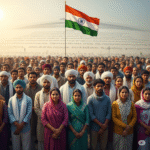Mumbai, India— The Indian fashion industry is stepping into a more eco-conscious era in 2025, as designers, manufacturers, and consumers embrace sustainable practices to mitigate environmental impact. From using eco-friendly materials to adopting circular production models, the industry is redefining itself while preserving the essence of Indian craftsmanship.
Sustainability Takes Center Stage
Leading designers likeAnita Dongre,Sabyasachi Mukherjee, andRahul Mishraare championing sustainability by incorporating organic fabrics, natural dyes, and ethical labor practices into their collections. Anita Dongre’s“Grassroots”line, for example, focuses on empowering rural artisans while utilizing biodegradable materials, setting a benchmark for eco-friendly luxury fashion.
The trend has extended to fast fashion brands as well. Retail giants likeFabIndiaandBibahave launched sustainable collections, featuring upcycled textiles and minimalist designs that appeal to eco-conscious millennials and Gen Z consumers.
Circular Fashion Gains Momentum
The concept of circular fashion is gaining traction in India. Brands are adopting recycling and upcycling initiatives to minimize waste and extend the lifecycle of garments. Startups likeDoh Tak KehandPomogrenadeare pioneering efforts to transform textile waste into stylish, wearable art.
Clothing rental platforms, such asFlyrobeandThe Stylease, have further popularized sustainable consumption by promoting a “borrow, wear, return” model. This has not only reduced textile waste but also made high-fashion accessible to a broader audience.
Support from Government and Industry
TheMinistry of Textileshas introduced initiatives to promote sustainable production, including subsidies for eco-friendly materials and funding for small-scale artisans. Programs under theSustainable Fashion Initiative Indiaaim to educate designers and manufacturers on green practices, while collaborations with organizations likeUnited Nations Environment Programme (UNEP)are amplifying the industry’s efforts on a global scale.
Consumer Shift Drives Change
Sustainability is no longer a niche concept in Indian fashion. A recent survey byNielsenIQrevealed that67% of Indian consumersprefer purchasing from brands that prioritize eco-friendly practices. With rising awareness of climate change and ethical consumption, sustainable fashion is becoming a mainstream choice.
Conclusion
As India’s fashion industry evolves, sustainability is emerging as the cornerstone of its future. By blending innovation with tradition, the industry is not only preserving the planet but also ensuring the livelihood of artisans and the integrity of Indian craftsmanship.









